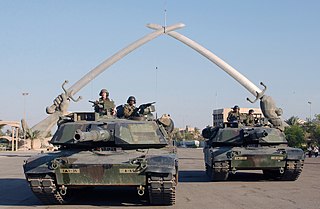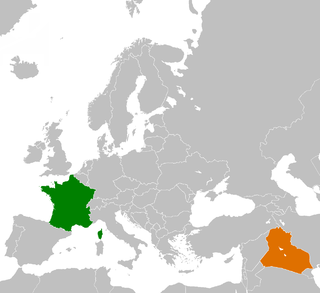Related Research Articles

Saddam Hussein was an Iraqi politician and dictator who served as the fifth president of Iraq from 16 July 1979 until 9 April 2003. A leading member of the revolutionary Arab Socialist Ba'ath Party, and later, the Baghdad-based Ba'ath Party and its regional organization, the Iraqi Ba'ath Party—which espoused Ba'athism, a mix of Arab nationalism and Arab socialism—Saddam played a key role in the 1968 coup that brought the party to power in Iraq.

The Iraq disarmament crisis was claimed as one of primary issues that led to the multinational invasion of Iraq on 20 March 2003. Since the 1980s, Iraq was widely assumed to have been producing and extensively running the programs of biological, chemical and nuclear weapons. Iraq made extensive use of chemical weapons during the Iran–Iraq War in the 1980s, including against its own Kurdish population. France and the Soviet Union assisted Iraq in the development of its nuclear program, but its primary facility was destroyed by Israel in 1981 in a surprise air strike.

United Nations Security Council Resolution 1441 is a United Nations Security Council resolution adopted unanimously by the United Nations Security Council on 8 November 2002, offering Iraq under Saddam Hussein "a final opportunity to comply with its disarmament obligations" that had been set out in several previous resolutions. It provided a justification for the subsequent US invasion of Iraq.

The Gulf War was a 1990–1991 armed campaign waged by a 35-country military coalition in response to the Iraqi invasion of Kuwait. Spearheaded by the United States, the coalition's efforts against Iraq were carried out in two key phases: Operation Desert Shield, which marked the military buildup from August 1990 to January 1991; and Operation Desert Storm, which began with the aerial bombing campaign against Iraq on 17 January 1991 and came to a close with the American-led Liberation of Kuwait on 28 February 1991.

This article describes the positions of world governments before the actual initiation of the 2003 invasion of Iraq, and not their current positions as they may have changed since then.

Tariq Aziz was an Iraqi politician who served as Deputy Prime Minister, Minister of Foreign Affairs and a close advisor of President Saddam Hussein. Their association began in the 1950s when both were activists for the then-banned Arab Socialist Ba'ath Party. He was both an Arab nationalist and a member of the Chaldean Catholic Church.

James Addison Baker III is an American attorney, diplomat and statesman. A member of the Republican Party, he served as the 10th White House Chief of Staff and 67th United States Secretary of the Treasury under President Ronald Reagan and the 61st U.S. Secretary of State before returning as the 16th White House Chief of Staff under President George H. W. Bush.

April Catherine Glaspie is an American former diplomat and senior member of the Foreign Service, best known for her role in the events leading up to the Gulf War.

United Nations Security Council Resolution 678, adopted on 29 November 1990, after reaffirming resolutions 660, 661, 662, 664, 665, 666, 667, 669, 670, 674 and 677, the council noted that despite all the United Nations efforts, Iraq continued to defy the Security Council.
The Iraqi Revolutionary Command Council was established after the military coup in 1968, and was the ultimate decision-making body in Iraq before the American-led invasion in 2003. It exercised both executive and legislative authority in the country, with the Chairman and Vice Chairman chosen by a two-thirds majority of the council. The Chairman was also then declared the President of Iraq and he was then allowed to select a Vice President. After Saddam Hussein became President of Iraq in 1979 the council was led by deputy chairman Izzat Ibrahim ad-Douri, deputy Prime Minister Tariq Aziz, and Taha Yassin Ramadan, who had known Saddam since the 1960s.

The Battle of Khafji was the first major ground engagement of the Persian Gulf War. It took place in and around the Saudi Arabian city of Khafji, from 29 January to 1 February 1991 and marked the culmination of the Coalition's air campaign over Kuwait and Iraq, which had begun on 17 January 1991.

The Iraqi invasion of Kuwait was an operation conducted by Iraq on 2 August 1990, whereby it invaded the neighboring State of Kuwait, consequently resulting in a seven-month-long Iraqi military occupation of the country. The invasion and Iraq's subsequent refusal to withdraw from Kuwait by a deadline mandated by the United Nations led to a direct military intervention by a United Nations-authorized coalition of forces led by the United States. These events came to be known as the first Gulf War, eventually resulting in the forced expulsion of Iraqi troops from Kuwait and the Iraqis setting 600 Kuwaiti oil wells on fire during their retreat, as a scorched earth strategy.

A dispute exists over the legitimacy of the 2003 invasion of Iraq. The debate centers around the question whether the invasion was an unprovoked assault on an independent country that may have breached international law, or if the United Nations Security Council authorized the invasion. Those arguing for its legitimacy often point to Congressional Joint Resolution 114 and UN Security Council resolutions, such as Resolution 1441 and Resolution 678. Those arguing against its legitimacy also cite some of the same sources, stating they do not actually permit war but instead lay out conditions that must be met before war can be declared. Furthermore, the Security Council may only authorise the use of force against an "aggressor" in the interests of preserving peace, whereas the 2003 invasion of Iraq was not provoked by any aggressive military action.

Michael R. Gordon has been a national security correspondent for The Wall Street Journal since October 2017. Previously, he was a military and diplomacy correspondent for The New York Times for 32 years. During the first phase of the Iraq War, he was the only newspaper reporter embedded with the allied land command under General Tommy Franks, a position that "granted him unique access to cover the invasion strategy and its enactment". He and General Bernard E. Trainor have written three books together, including the best-selling Cobra II. As journalists for The New York Times, Gordon and Judith Miller were the first to report Saddam Hussein's alleged nuclear weapons program in September 2002 with the article "U.S. Says Hussein Intensifies Quest for A-Bomb Parts."

French–Iraq relations are the relations between France and Iraq. France played a major role in Iraqi secession from the Ottoman Empire and eventual freedom from British colonial status. The Franco-Iraqi relationship is often defined by conflict and peace, with France supporting Iraq during the Iran-Iraq War, supporting intervention in Iraq in Operation Desert Storm, and opposing the 2003 US Invasion of Iraq. As of 2004, Iraq maintains an embassy in Paris and France maintains an embassy in Baghdad.

Iraqi–Italian relations are the interstate ties relations between Iraq and Italy. Iraq has an embassy in Rome and Italy has an embassy in Baghdad and a consulate-general in Basra.
The timeline of the Gulf War details the dates of the major events of the 1990–1991 war. It began with the Iraqi invasion of Kuwait on 2 August 1990 and ended with the Liberation of Kuwait by Coalition forces. Iraq subsequently agreed to the United Nations' demands on 28 February 1991. The ground war officially concluded with the signing of the armistice on 11 April 1991. However, the official end to Operation Desert Storm did not occur until sometime between 1996 - 1998. Major events in the aftermath include anti-Saddam Hussein uprisings in Iraq, massacres against the Kurds by the regime, Iraq formally recognizing the sovereignty of Kuwait in 1994, and eventually ending its cooperation with the United Nations Special Commission in 1998.

The Helsinki Summit (1990) was a private, bilateral meeting between American President George H. W. Bush and Soviet President Mikhail Gorbachev that took place in Helsinki, Finland on September 9th, 1990. Due to the vested interests of both the Soviet Union and the United States in the Gulf Crisis' resolution, August 1990 Iraqi invasion of Kuwait was the primary topic of discussion for the leaders during the Helsinki Summit. The concerted efforts at easing American-Soviet tensions in the aftermath of the Cold War was another prominent topic, among other notable current events. At the summit's conclusion, Presidents Bush and Gorbachev produced a document of joint statements that illuminated the areas in which the leaders had committed to aligning their foreign policy goals. The summit was followed by a press conference wherein members of the media questioned Presidents Bush and Gorbachev about the content of their meeting and the justifications for their joint statements.
The Gulf War began on the 2 August 1990, when Iraq invaded Kuwait. The war was fought between the international coalition led by the United States of America against Iraq. Saddam Hussein's rationale behind the invasion is disputed and largely unknown. No Iraqi document has ever been discovered explicitly listing these.
References
- ↑ Lawrence Freedman and Efraim Karsh, The Gulf Conflict: Diplomacy and War in the New World Order (New Jersey, 1883), 233–34.
- 1 2 "Persian Gulf: Mission of Peace, James Baker and Gerald Post on the Iran-Kuwait Crisis" United States Department of State Dispatch, January 7, 1991.
- ↑ Lawrence Freedman and Efraim Karsh, The Gulf Conflict: Diplomacy and War in the New World Order (New Jersey, 1993), 236.
- ↑ Lawrence Freedman and Efraim Karsh, The Gulf Conflict: Diplomacy and War in the New World Order (New Jersey, 1883), 242.
- ↑ Phyllis Bennis and Michel Moushabeck, Beyond the Storm: A Gulf Crisis Reader (New York, 1991), 66.
- ↑ Lawrence Freedman and Efraim Karsh, The Gulf Conflict: Diplomacy and War in the New World Order (New Jersey, 1993), 258.
- ↑ Lawrence Freedman and Efraim Karsh, The Gulf Conflict: Diplomacy and War in the New World Order (New Jersey, 1993), 259,
- ↑ Lawrence Freedman and Efraim Karsh, The Gulf Conflict: Diplomacy and War in the New World Order (New Jersey, 1993), 259 and Patrick E. Tyler, "Confrontation in the Gulf: Iraq Still Pressing for Talks Between Baker and Hussein," New York Times, Jan. 10, 1991.
- 1 2 frontline: the gulf war: voices in the storm: at the brink of war
- ↑ Micah L. Sifry and Christopher Cerf, The Gulf War Reader: History, Documents, Opinions (Toronto, 1991), 175.
- ↑ frontline: the gulf war: oral history: tariq aziz
- ↑ Lawrence Freedman and Efraim Karsh, The Gulf Conflict: Diplomacy and War in the New World Order (New Jersey, 1993), 257.
- ↑ frontline: the gulf war: oral history: tariq aziz